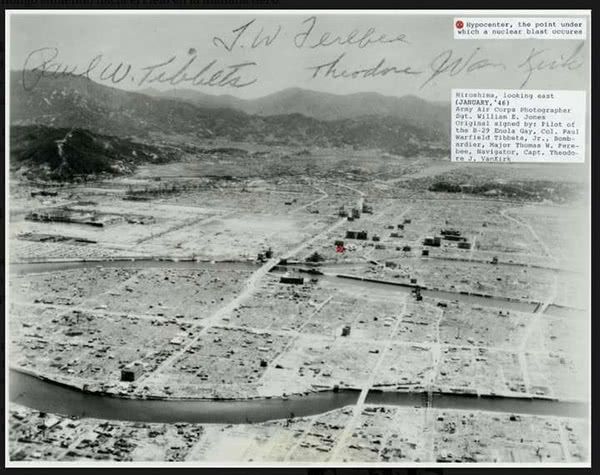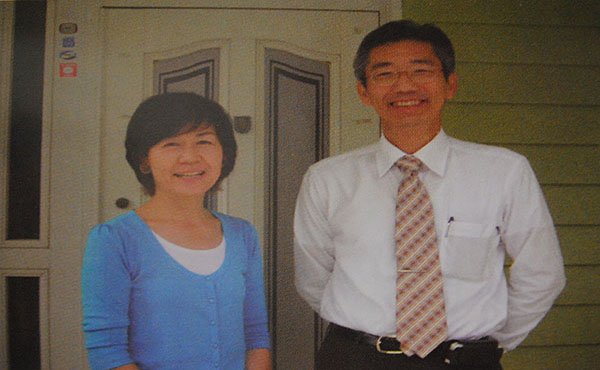From "Los cerezos en flor" by José Miguel Cejas, Rialp, 2015
Chapter 20. JAPAN'S GREAT REVENGE
We have to give thanks:
the snow that covers the ground
also belongs to heaven.
Issa
My mother always recalled that day down to the smallest detail, as though it had just happened an hour before. Almost twelve years old then, she was in school on a hot August day. When they had finished the first class at eight in the morning, their teacher told them that during recreation time they were all going to clean up the patio of the school, to remove the crabgrass and weeds. This is something quite common in Japan, as it teaches the students to consider the school as their own and to learn to be orderly.
They were hard at work when, at a little after eight, they heard the sound of a plane. They looked up and suddenly sensed a fearful silence, amid a bright blinding flash. A second later a hurricane-like wind lifted them in waves, scattering them all over the patio. My mother fell ten yards from where she was working and thank God wasn’t hurt. The teachers didn’t know what to do. They quickly opened the doors of the school and all the children ran to their homes terrified, in a huge cloud of brown dust.
The school was situated on a hill on the outskirts of the city. From there one had a great view of the lovely city of Hiroshima with its buildings spread over the six islands formed by the seven rivers of the estuary. To the south were the docks and further on the inland sea with its many islands and islets. Every day when they came to school they would stop for a few seconds to contemplate the view, but that morning when they saw glimpses of the city as they ran down the hill they were almost paralyzed. Hiroshima had become a city of ruins with people screaming and crying and suffering from terrible burns.
The day became strangely dark and when my mother reached her house, which was half destroyed, she found her parents lying on the floor shocked and almost senseless with some bruises and burns. When they saw their daughter arrive they got up, and hugged one another, crying and giving thanks that they had all survived. They then gathered up a few indispensable things and began walking towards the home of some relatives, while there resounded around them city sirens and cries of Tasukete! Tasukete! (Help! help!)
Fortunately the home of the relatives was still standing, but on entering they found an aunt with her body completely burned, hovering between life and death. She died that same night.
Two days later when news arrived that Nagasaki had also been bombed, they fell into a deep depression. They were so confused that they thought the whole thing must be a bad dream, a nightmare that would end at any moment. That explains why on the 15th of August, when they heard on the radio—for the first time in their life—the voice of Emperor Tenno, who was announcing the end of the war, they experienced along with the whole country a great feeling of relief.
The emperor’s message, which they didn’t understand very well at the time owing to the poor radio transmission, was the following: The enemy has begun to use a new bomb, overwhelmingly cruel, whose capacity to provoke damage is truly incalculable, and which has caused the death of many innocent lives. If we continue fighting, not only will the result be the collapse and destruction of the Japanese nation, but it will also lead to the complete extinction of human civilization.

My mother never forgot that event and, although she wasn’t Christian, she taught me to never hold rancor against anyone, and to always forgive others, a lesson I always remembered.
Hisae’s conversion
I met my husband in Kyoto at the beginning of the seventies, when I was taking piano lessons and he was studying languages. A mutual friend of ours in Opus Dei, who knew of our common passion for music, introduced us. We went out together, fell in love, and grew together in our knowledge of the Christian faith.
During that time the two of us were studying the catechism, which we saw, in accord with the Japanese mentality, as a collection of guidelines and rules to learn and respect. Later we discovered, thanks to the formation received in Opus Dei, that living as a Christian was not simply a matter of fulfilling precepts, but meant loving God and serving him with our whole heart in the midst of family and social life, and in ordinary work.
We were both baptized and later each of us responded to God’s call to become a member of the Work. This united us still more closely, since even before becoming Catholic, we were eager to form a “bright and cheerful” home, as Saint Josemaría said.
We got married and went to Rome during our honeymoon. There we were received by the Prelate of Opus Dei, Fr. Alvaro del Portillo. When he learned we were both in the Work, he told us that we should be an exemplary couple, thinking of so many people in our country whom our Lord would call in the future to dedicate themselves fully to Him within marriage.
He advised us never to quarrel in front of the children and gave each of us a rosary, after kissing it with affection.
Don Alvaro in Japan
It is easy to understand our joy when Don Alvaro del Portillo came to Nagasaki on February 14, 1987. We went to the airport with our children to welcome him. I offered him a flowering cherry branch and my daughter gave him a bouquet of flowers. Although it was winter, and snow was quite common in February, during those days the temperature rose and we enjoyed spring-like weather.
Like so many Christians who come to this city, which is called “the Rome of the Orient,” he prayed before the image of our Lady where the secret Christians used to meet, and visited the monument of the martyrs.
He recalled that one of them, the Mexican Felipe de Jesus, was a distant relative of his. And he told us: “The others thought that he wouldn’t be capable of martyrdom because he seemed somewhat weak. But God had such patience with him that in the end he gave a lesson of generosity and courage, and heroism in the face of death accepted for love of God. I have entrusted myself and all of you to him, so that we be people God can rely on.”
A get-together with Don Alvaro was organized in the school in Nagasaki, and hundreds of people attended. Most of them were Buddhists or without any religion, and they were surprised at how he created a warm and pleasant atmosphere around him.“I had the sensation,” a non-Christian woman said afterwards, “that I was in the living room of my house, chatting after dinner with a friend of the family.”

At the beginning he told us how much it would have pleased the Founder of Opus Dei to visit our country. “I recall his great desire to be able to do good in this country, where there are so many people filled with human virtues, capable of working with extraordinary effort and intensity. He reflected that, if all of them knew Christ, if all met Christ, if all loved Christ, what a great good this would be for humanity. Because all of those human virtues that are here, all of that industriousness in the people of Japan, placed at the service of God, would be something extraordinary.”
Then he said something that surprised me. He spoke about the Founder’s sorrow when he heard about the destruction of Hiroshima and Nagasaki. “He prayed for all the victims and the wounded, so that the people would not despair, so that they would find God in the midst of their suffering. He also prayed for those who later on would suffer after-effects from the radiation.”
I glanced from time to time at the faces of those around me, especially at the non-Christians. Although we Japanese do not ordinarily show our feelings outwardly, you could see that many were moved.
A Catholic music teacher spoke about her parents, who were practicing Buddhists and very generous people. What could she do, she asked, to bring them to Christ?
“If they ask you about the Christian religion, speak about what you have in your heart, but without arguing, because they are in good faith, and also because that is not the path. The faith is a gift, which one does not acquire by one’s own reasoning, on the strength of studying. God grants it to whomever he wants. There are persons who do not receive the gift of faith, and perhaps they behave better than many Christians. They give us an example of sincerity, of honesty, of understanding… In addition, my daughter, in this specific case they are your parents, for whom you should have nothing but love, gratitude and respect. And pray for them.”
That visit comforted us a lot. He visited various cities and spoke about God to all kinds of people. I was especially impressed (and I think my mother would have liked to have heard it) by what he said in Kyoto:
“When I was in high school,” Blessed Alvaro said, “I was told that the population of Japan was about one hundred million. Now you are a hundred and twenty million people, but very few know Christ. If the human virtues that you have here—industriousness, order, and so many others—were put at the service of God, what a great impact it would have throughout the world. It would be much more than an atomic bomb. This could be the ‘great revenge’ of Japan.”
